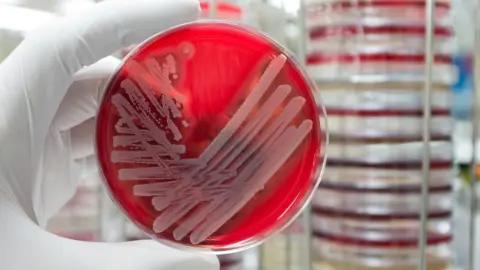Superbug 'sleuthing' finds secret outbreaks
 Getty Images
Getty ImagesA feat of "genomic sleuthing" has uncovered 173 secret outbreaks of the superbug MRSA, a study shows.
They were found in the east of England over the course of just one year, according to the details published in Science Translational Medicine.
The researchers say their approach could transform the way we tackle MRSA and other superbugs.
Detecting outbreaks that are happening under our noses should cut the number of people infected.
- MRSA - or methicillin-resistant Staphylococcus aureus - is a bacterial infection that is resistant to a number of widely-used antibiotics
- It can cause life-threatening infections if the bug breaches the skin, such as through a surgical wound
Detective work
Hospitals in the UK have become very good at catching outbreaks of MRSA, especially when they happen in the same place at the same time - such as in one hospital ward.
But MRSA also spreads outside of hospitals, in people's homes, in care homes; and patients and staff also move around from place to place.
Doctors will see the individual cases, but cannot always spot the bigger picture and catch the outbreak.
Prof Sharon Peacock, one of the researchers, told the BBC: "Patients move around wards very quickly and you don't always spot the links Sherlock Holmes might detect, but the genomics does it for you."
The team at the Wellcome Trust Sanger Institute sequenced the genetic code of every single MRSA sample that came through three hospitals and 75 GP surgeries.
They then pieced together the clues in a feat of genetic genealogy.
By looking at the genetic code, the researchers could work out which samples were closely related and therefore part of the same outbreak.
Surprise
They found 173, ranging from outbreaks affecting two patients up to 44.
"I was surprised by how many we detected," Prof Peacock said.
She added: "This could reverse the way we do infection control to be much more targeted, efficient and effective."
This strategy cannot prevent an outbreak from occurring, but it can nip it in the bud.
It is possible to get rid of MRSA, which mostly lives up the nose or on skin, using creams and antiseptic baths.
A smaller scale version of this study managed to track down the carrier of MRSA and bring an outbreak in a baby unit to an end.
Huge advances in DNA sequencing mean the whole genome of a bacterium can be worked out in a day for around £120.
The researchers are about to start a trial investigating the cost-effectiveness of introducing genomic detective-work into the NHS.
Dr Jonathan Pearce, the head of infections and immunity at the UK's Medical Research Council, said: "This study sheds light on MRSA transmission within and between hospitals and the community, which could help strengthen infection prevention and control measures."
Follow James on Twitter.
